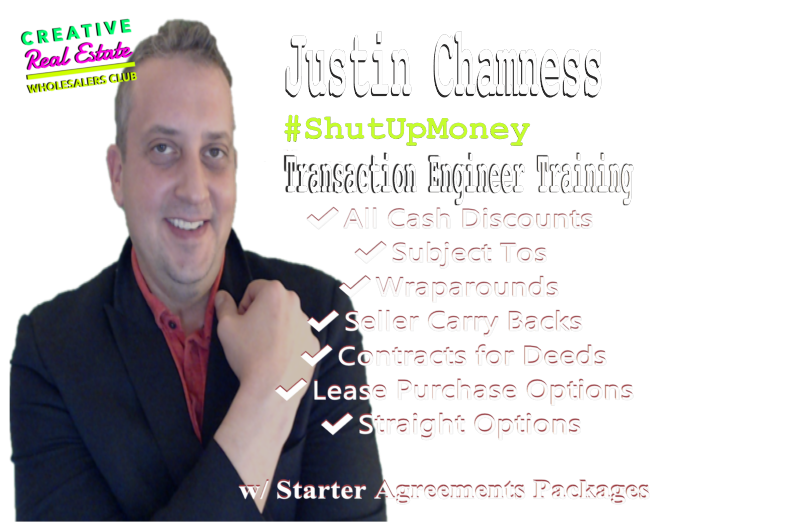All Cash Discounted Offer
Investors often employ a strategy of making an all-cash offer with the intention of completing the purchase quickly and typically at a discounted price. This approach involves using readily available funds (CASH) to buy a property outright, bypassing the need for mortgage financing. The allure for sellers lies in the swift and hassle-free transaction, which can be particularly appealing in situations where they seek a quick sale or prefer not to deal with the uncertainties associated with traditional financing. In exchange for the convenience and speed, investors often negotiate for a lower purchase price, leveraging the attractiveness of an all-cash, quick-close deal. Investors may employ a number of exit strategies including fix&flip, rental, wholesale assignment, and many others.
THE DISCOUNT CASH OFFER FORMULA:
(This is also locally influenced as each market may be different)
ARVs OVER $300k =ARV -15% -Repairs -Your Fee
ARVs UNDER $300k =ARV -17% -Repairs -Your Fee
ARVs UNDER $200k =ARV -20% -Repairs -Your Fee
ARVs UNDER $120k =ARV -30% -Repairs -Your Fee
Here's an example of buying discounted because you're paying all cash and closing quick:
Property Details:
Purchase price of the home: $300,000
Seller's outstanding mortgage balance: $200,000
Seller's equity in the property: $100,000
Estimated repair costs: $50,000
Property Assessment:
The buyer inspects the property and identifies significant repair needs.
Based on the repair assessment, the buyer determines that the property's value, considering the repairs required, is significantly lower than the after repair value.
Agreement and Closing:
The buyer and seller reach an agreement on the discounted purchase price, taking into account the repairs needed.
The closing takes place at a designated location, such as a closing agent's office or a title company.
The buyer pays the agreed-upon discounted purchase price of, let's say, $205,000 in cash.
Property Transfer and Repairs:
The seller transfers the property's title to the buyer.
The buyer assumes responsibility for all repairs and renovation costs.
Ongoing Ownership and Future Value:
The buyer manages the repairs and renovations to bring the property up to the desired condition.
The buyer may sell (assign) or decide to hold the property as an investment or choose to sell it in the future, potentially realizing a higher value after the repairs and improvements.
⭐ ASK THIS QUESTION TO SEE IF THIS "ALL CASH" STRATEGY FITS THE HOMEOWNER LEAD YOU'RE TALKING TO:
"Mr. Homeowner, If I were to offer you all cash and close quick, what's the lowest amount you could accept?"
⭐ You'll Know This Strategy Fits If The Homeowner Says:
"I need to sell this property as fast as possible."
"The house needs a lot of repairs, and I can’t afford to fix it."
"I’m facing foreclosure and need to avoid it."
"I’ve inherited this property, and I just want to get rid of it."
"I don’t want to deal with any financing contingencies or loan approval delays."
"I’ve had other buyers, but they’re taking too long to close."
"I don’t care about getting top dollar; I just want to sell quickly and move on."
Best For:
Distressed properties or properties in need of repairs.
Sellers who need immediate cash or are facing financial pressures like foreclosure or bankruptcy.
Sellers who prioritize speed and certainty over getting the highest price.

Agreement for This Strategy:
Purchase and Sale Agreement
CLOSES AT TITLE ATTORNEY CO
because DEED TRANSFERS
Quiz/Test: All Cash Discount Purchase Strategy
In the all cash discount purchase strategy, what is the formula used to determine the purchase price when the ARV (After Repair Value) is over $300k?
a) ARV - 10% - Repairs - Your Fee
b) ARV - 12% - Repairs - Your Fee
c) ARV - 15% - Repairs - Your Fee
d) ARV - 20% - Repairs - Your Fee
When the ARV is under $200k, what percentage is typically subtracted from the ARV in the all cash discount purchase strategy?
a) 12%
b) 15%
c) 17%
d) 20%
What factors should an investor consider when estimating repair costs in the all cash discount purchase strategy?
a) The property's size and layout
b) The extent of required repairs
c) The cost of materials and labor
d) All of the above
In the all cash discount purchase strategy, what additional fees should the investor include when calculating the purchase price?
a) Closing costs
b) Holding costs
c) Financing costs
d) Inspection fees
True or False: The all cash discount purchase strategy is primarily used for properties in need of significant repairs.
a) True
b) False
How does the investor determine the After Repair Value (ARV) of the property in the all cash discount purchase strategy?
a) By consulting with a real estate agent
b) By conducting a comparative market analysis
c) By assessing the property's potential rental income
d) By estimating the property's future value based on market trends
What due diligence should an investor conduct before finalizing the all cash discount purchase?
a) Property inspection to assess repair needs
b) Title search to identify any liens or encumbrances
c) Review of local zoning and property regulations
d) All of the above
What are the potential risks for an investor in the all cash discount purchase strategy?
a) Unexpected repair costs exceeding estimates
b) Difficulty in finding qualified contractors
c) Market fluctuations affecting property values
d) All of the above
What is the role of the investor's attorney in the all cash discount purchase strategy?
a) Reviewing and preparing legal documents
b) Negotiating the purchase agreement with the seller
c) Facilitating the closing process
d) Providing legal advice and guidance
In the all cash discount purchase strategy, what options does the investor have after acquiring the property?
a) Sell the property immediately for a profit
b) Rent the property for passive income
c) Rehabilitate the property and sell it at a higher price
d) All of the above
True or False: The all cash discount purchase strategy is suitable for homeowners who are facing foreclosure and need an immediate sale.
a) True
b) False


